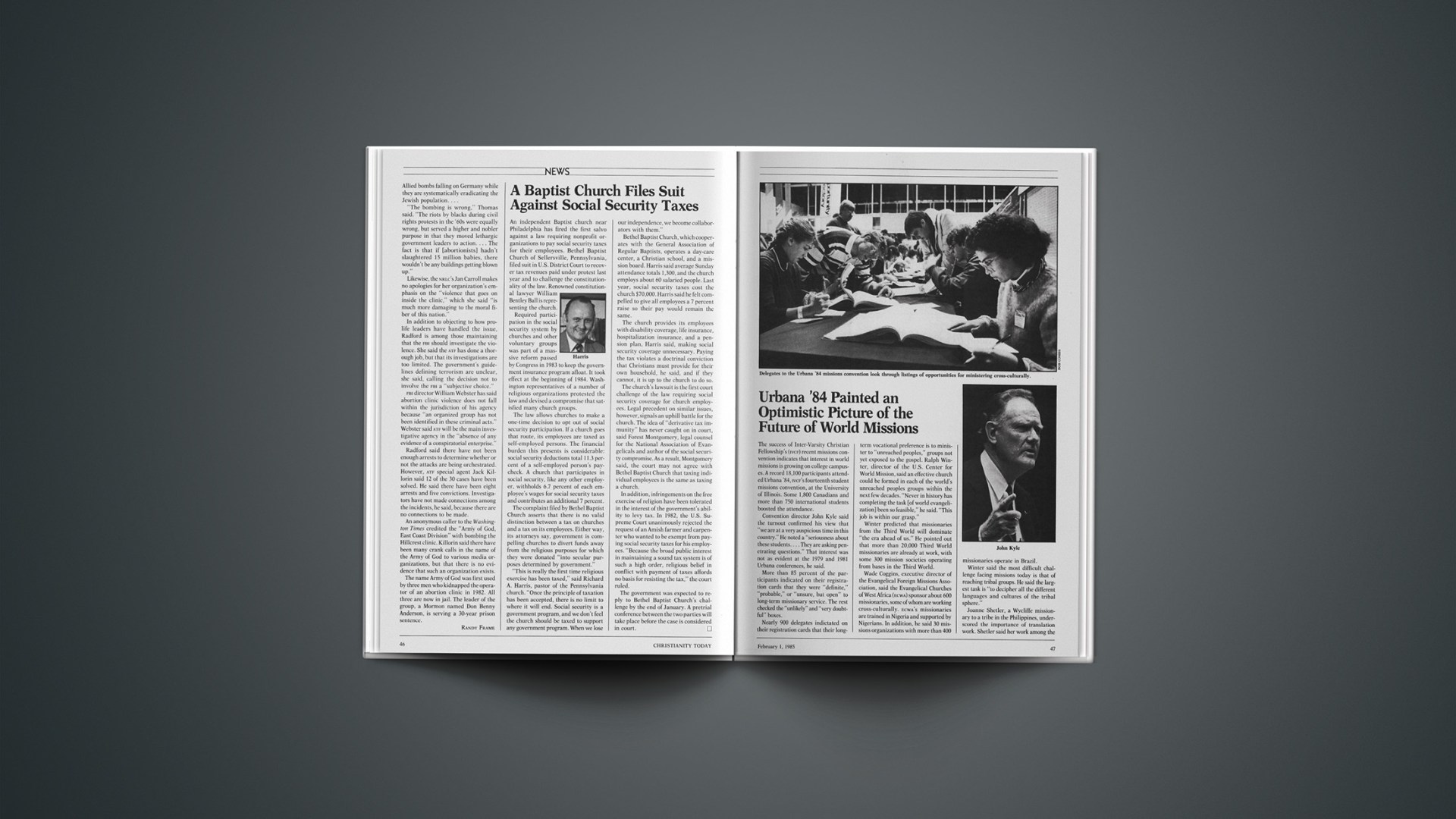An independent Baptist church near Philadelphia has fired the first salvo against a law requiring nonprofit organizations to pay social security taxes for their employees. Bethel Baptist Church of Sellersville, Pennsylvania, filed suit in U.S. District Court to recover tax revenues paid under protest last year and to challenge the constitutionality of the law. Renowned constitutional lawyer William Bentley Ball is representing the church.
Required participation in the social security system by churches and other voluntary groups was part of a massive reform passed by Congress in 1983 to keep the government insurance program afloat. It took effect at the beginning of 1984. Washington representatives of a number of religious organizations protested the law and devised a compromise that satisfied many church groups.
The law allows churches to make a one-time decision to opt out of social security participation. If a church goes that route, its employees are taxed as self-employed persons. The financial burden this presents is considerable: social security deductions total 11.3 percent of a self-employed person’s paycheck. A church that participates in social security, like any other employer, withholds 6.7 percent of each employee’s wages for social security taxes and contributes an additional 7 percent.
The complaint filed by Bethel Baptist Church asserts that there is no valid distinction between a tax on churches and a tax on its employees. Either way, its attorneys say, government is compelling churches to divert funds away from the religious purposes for which they were donated “into secular purposes determined by government.”
“This is really the first time religious exercise has been taxed,” said Richard A. Harris, pastor of the Pennsylvania church. “Once the principle of taxation has been accepted, there is no limit to where it will end. Social security is a government program, and we don’t feel the church should be taxed to support any government program. When we lose our independence, we become collaborators with them.”
Bethel Baptist Church, which cooperates with the General Association of Regular Baptists, operates a day-care center, a Christian school, and a mission board. Harris said average Sunday attendance totals 1,300, and the church employs about 60 salaried people. Last year, social security taxes cost the church $70,000. Harris said he felt compelled to give all employees a 7 percent raise so their pay would remain the same.
The church provides its employees with disability coverage, life insurance, hospitalization insurance, and a pension plan, Harris said, making social security coverage unnecessary. Paying the tax violates a doctrinal conviction that Christians must provide for their own household, he said, and if they cannot, it is up to the church to do so.
The church’s lawsuit is the first court challenge of the law requiring social security coverage for church employees. Legal precedent on similar issues, however, signals an uphill battle for the church. The idea of “derivative tax immunity” has never caught on in court, said Forest Montgomery, legal counsel for the National Association of Evangelicals and author of the social security compromise. As a result, Montgomery said, the court may not agree with Bethel Baptist Church that taxing individual employees is the same as taxing a church.
In addition, infringements on the free exercise of religion have been tolerated in the interest of the government’s ability to levy tax. In 1982, the U.S. Supreme Court unanimously rejected the request of an Amish farmer and carpenter who wanted to be exempt from paying social security taxes for his employees. “Because the broad public interest in maintaining a sound tax system is of such a high order, religious belief in conflict with payment of taxes affords no basis for resisting the tax,” the court ruled.
The government was expected to reply to Bethel Baptist Church’s challenge by the end of January. A pretrial conference between the two parties will take place before the case is considered in court.










